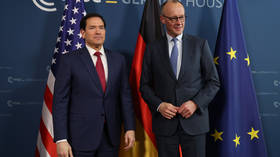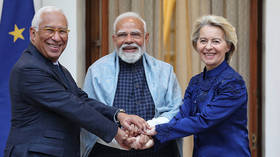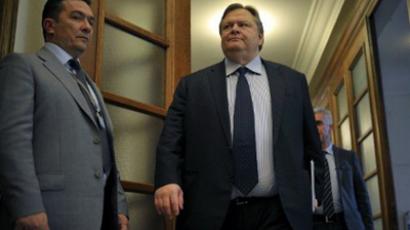EU encouraging Greece ‘to head towards revolution’
With Greece finally implementing the biggest debt writedown in history and predictions the country’s debt is to decline more than previously expected, a solution to the crisis may seem in view, but some politicians disagree.
Greece has swapped $232.5 billion worth of privately-held bonds with new ones worth less than half their original value. The swap paves the way for the approval of the second international bailout without which the Greek government would have to announce default.Following the deal, the Fitch ratings agency upgraded Greece's credit rating to a B-, assigning it a “stable outlook” status. Earlier, Fitch had classified the swap deal as a forced “distressed debt exchange” and assigned Greece RD, or “restricted default” status.In the meantime Jean-Claude Juncker, the prime minister of Luxembourg and the chairman of the meetings of eurozone finance ministers, said that Greece’s debt is now expected to decline to 117 per cent of GDP by 2020, less than the 120 per cent that had previously been expected. Juncker noted that the new estimates appeared because of greater-than-expected voluntary participation in the writedown of Greece’s debt. Juncker’s somewhat optimistic outlook came at the end of a meeting of eurozone finance ministers in Brussels. But other data does not seem to support this optimistic view. Previous reports by Greece’s international inspectors indicated that there was a significant chance that the country’s debt targets could be missed. Paul Nuttall, an MEP from the UK Independence Party, believes the upcoming second bailout will do nothing to resolve Greece’s economic woes. “Greece is in serious trouble,” he said to RT, “You just have to look at the amount of people who are out on the street demonstrating at the moment. Suicide rates are up. The minimum wage has been cut. There’s mass homelessness in that country at the moment. All the European Union is doing down this line is it’s encouraging the cradle of civilization to head towards revolution, because that’s what will happen if we continue with these austerity measures.”Nuttall also said that Europe’s political elite were almost living in a parallel universe. “These bailouts aren’t about saving Greece,” he said “They have nothing to do with the Greek people. All they’re about is saving the beloved euro project.” He called the second €130-billion bailout “nothing more than a sticking plaster over a big, gaping economic wound.”Nuttall expressed his belief that the only way out was for Greece and other Mediterranean countries to revert back to their own currencies, which would be worth less than the euro and would hence propel their exports. However, the leaders of the EU “won’t allow these countries to leave and what they will continue to do is they will continue with more bailouts.”Nuttall called the very idea of having countries like Greece, Spain and Portugal in the same currency zone as Germany “farcical”.Moreover, he took note of public anger over the appointment of technocratic governments in place of democratically elected ones. “Imagine if that happened in Britain, where David Cameron was removed and we had Neil Kinnock or even Peter Mandelson put in his place,” he hypothesized “The people of Britain would be out on the streets”.Nuttall noted some alarming trends in European politics, with unrest in the south of the continent and growing Euroscepticism and far-right sentiment, also fueled by the EU’s lenient immigration policies, in the north. He predicted a major shift towards the far-right Eurosceptic parties in the 2014 European elections.














